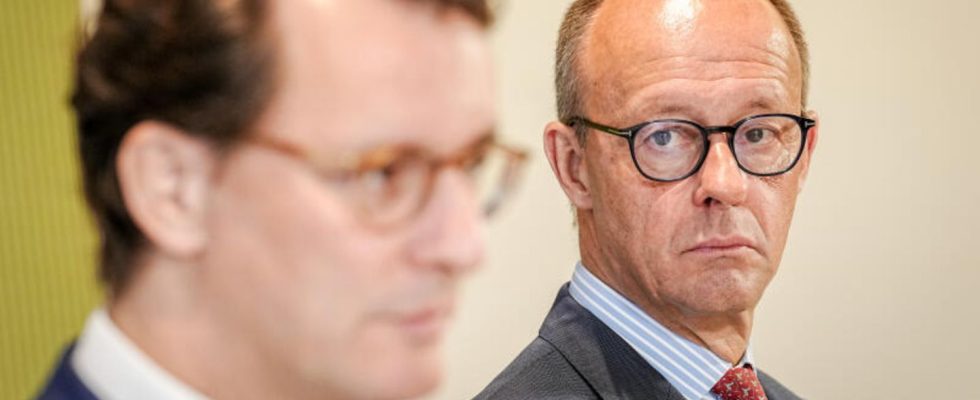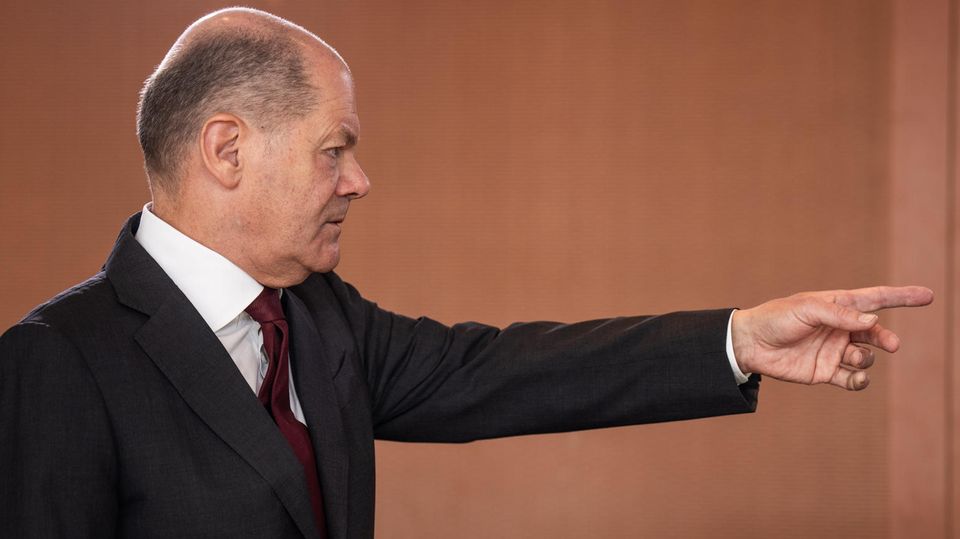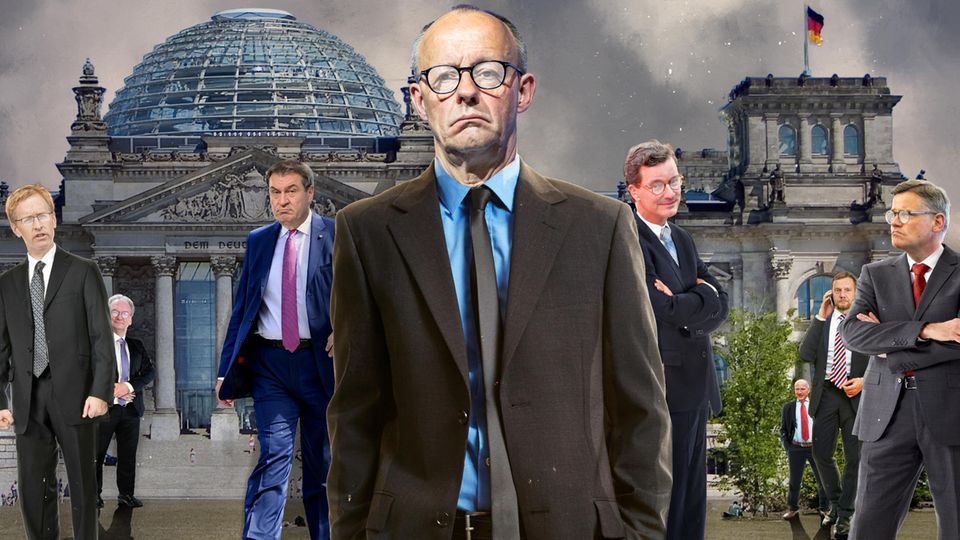A little jibe from the Chancellor is enough – and the next episode of the Union’s internal competition between Friedrich Merz and Hendrik Wüst begins. What was going on then?
There are moments in politics when you can read the greatest things from the smallest gestures. You just have to want it. “You go first,” says Friedrich Merz on the way to the press conference. And Hendrik Wüst leads the way. Of course, he doesn’t need to be told twice, that’s how he understands his role in the Union. He rules and shows where to go. The man behind him just talks.
Now it’s like this with Merz and Wüst: wherever the CDU leader and the NRW Prime Minister appear together, the actual topic of the event is of secondary importance. You can want to talk about escape and migration or about the women’s quota in the Union, it doesn’t matter, in the end it’s always about Merz and Wüst. How well do they really get along? Who is taunting who now? And above all: Who will be the candidate for chancellor?
At some point on this Tuesday morning the question comes up: What is the level of competition between you?
It’s all nonsense, says Merz. “It’s a nice story. But it’s a story, nothing more. If you want to write it, write it.”
Okay, then let’s do it.
Friedrich Merz and Hendrik Wüst: The dramaturgy of chance
The latest story by Friedrich Merz and Hendrik Wüst begins with a man you wouldn’t want to trade places with. Thorsten Schick, head of the CDU in the state parliament of North Rhine-Westphalia, traveled specially from Düsseldorf to Berlin. He brought his group with him to talk to his party friends from the NRW state group in the Bundestag about current issues. Instructed his spokesman to organize a press conference at the state representation at the end of the conference – and then he was only left with a small supporting role.
Schick greets everyone warmly, says five introductory sentences, then listens for 40 minutes. Questions for him? No. You can’t blame Schick. His press conference with Merz and Wüst, planned long in advance, fell on the morning after a long night meeting of all prime ministers with Chancellor Olaf Scholz. And as the dramaturgy of chance would have it, the Merz-Wüst saga promises to be particularly exciting again.
You don’t have to go too deeply into the negotiations between the Prime Minister and the Chancellor. You just have to know that Merz recently visited Scholz twice to talk about possible cooperation in migration policy. Merz sees it this way: Whatever the Chancellor and the state leaders negotiate, in the end the only thing that counts is what becomes law. And that has to go through the Bundestag. Sure, Scholz doesn’t need the Union faction for a majority – but wouldn’t a broad consensus on this issue be an important signal?
Wüst, in turn, has heard concrete suggestions for a different approach to flight and migration, especially in the past few days. For example, he is now demanding that Germany should also offer asylum procedures in the countries where the applicants come from. As the CDU’s most important head of government, Wüst is a central figure in the group of prime ministers.
When the Chancellor teases
In terms of content, Merz and Wüst are on the same page. The Union likes to describe its migration policy as “humanity and order”. Rhetorically speaking, it can be said that Wüst bases his position more on humanity, Merz more on order. From a strategic point of view, only one question is important: which of the two is the Union’s chief negotiator?
Only Wüst sat at the table in the Chancellery on the night from Monday to Tuesday. At some point, around half past ten, people talk about a proposal from the states, originally a CDU idea from Saxony. It is about a commission for migration issues in which as many social groups as possible should be involved. There is debate about what “cross-party” means in this context. Scholz indicated that he would then have to stop his exclusive discussions with a party leader. He means the rounds with Merz.
A few minutes later, RTL political director Nikolaus Blome tweeted: “The air is burning in the Chancellery. Scholz accuses Wüst and the CDU-MP of an intrigue against party leader Merz: Because the CDU-MP are demanding their own migration commission that wants to negotiate with Scholz bypassing Merz .”
The tweet quickly gets a lot of reach. He is also read carefully in the CDU. Especially among those who are not in the Chancellery. So now Scholz is already defending poor Merz against the tricks of his opponent Wüst? No way!
As we found out later, Scholz probably only succinctly pointed out, as a small swipe at Wüst and Merz, that people in North Rhine-Westphalia stick together. So a little tip, no intrigue. In the Merz-Wüst saga, one anecdote is now enough to trigger the big drama.
And so the morning after they stand in front of the press, Wüst in the middle, Merz on the right, extra Schick on the left. The question about personal competition comes at the very end. Until then it’s about content, assessments and intentions. The critical phase now begins for journalists, in which it is tempting to interpret everything through facial expressions and gestures. After all, you have to look very closely at Merz and Wüst.
Does Merz nod often enough when Wüst says something clever? Doesn’t he laugh a little too obviously at one or two of the Prime Minister’s jokes? Did Wüst actually praise Merz for the title of a position paper? And why is he already being brought the second drink? Couldn’t he give Merz a run for his money?
Such things.
“Your impression is wrong”
Merz makes every effort not to leave the slightest doubt that he and Wüst always act and communicate in close harmony with each other. Here, in the garden of the NRW state representation, they concluded the Pilsfrieden of Berlin in the summer after days of mutual taunts. It was a well-staged cheers to unity. There just wasn’t much left of it.
So Merz tries again. There was never any disagreement between the Union Prime Minister and him. “I would like to express my thanks, also to Hendrik Wüst personally, as the Prime Minister of the most populous federal state, for the very close coordination we have carried out here in the last few weeks and for the fact that we continued to do so last evening and throughout the night.” At no point did it fall apart.
As if this detail wasn’t already remarkable, Wüst now says: nothing at all. He actually did much more of the speaking at this press conference. Only at the end does he become tight-lipped. Competition? Wüst looks at the questioning journalist with a smile. “Your impression is wrong.”
Of course, that’s not the best cliffhanger. But Merz and Wüst can now manage without it. The next episode is coming. Guaranteed.



